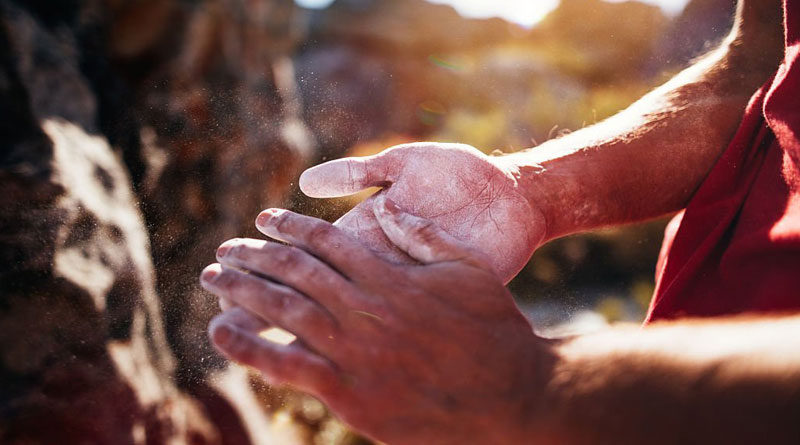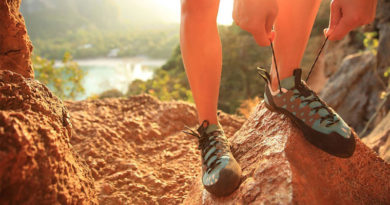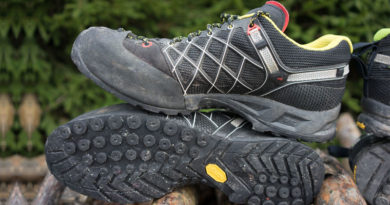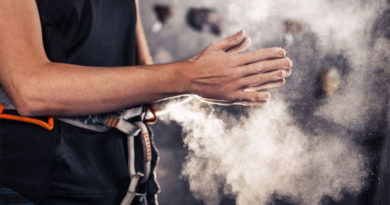What Does Chalk Do For Climbing?
Chalk is used in rock climbing and other forms of climbing to strengthen the grip on holds and prevent sweating palms. Climbing chalk is composed of magnesium carbonate, which absorbs moisture and keeps hands dry, hence decreasing slipping.
Climbers apply chalk to their hands, which forms a thin layer on their skin and improves their grip on holds. This is especially crucial for climbers working on challenging routes or boulder issues where even minor slippage might result in a fall.
In addition to improving grip, chalk also reduces friction between your skin and climbing holds. Reduced friction means there will be less chance of injury. With all these benefits, there are still some climbing areas and gyms that do not allow the use of chalk. This is because chalk can be messy and cause respiratory irritation upon inhalation. So, do check the rules of your climbing gym before using chalk.
How Chalk Works for Climbers?
There are several ways that chalk can help climbers:
Made of Magnesium Carbonate
Chalk aids climbing by absorbing moisture and improving grip on holds. The major component of chalk is magnesium carbonate, a granular material that dries out the skin and aids in sliding.
Provides a Better Grip on Holds
When a climber rubs chalk on their hands, the powder forms a thin layer on their skin. This layer improves hold grip, making it easier for climbers to keep their grip even on challenging routes or boulders. The chalk also helps to reduce friction between the skin and the climbing holds, which can reduce the chance of damage.
Absorbs Moisture to Keep Hands Dry
Chalk, in addition to providing grip, can assist climbers to keep their hands dry and comfortable, especially in hot and humid situations. This is because the chalk’s magnesium carbonate absorbs sweat and moisture, which can make hands slippery and difficult to grip.
Reduces Friction between Skin and Holds
Chalk reduces friction between the skin and the climbing holds, making it easier for climbers to keep their grasp. Friction is the force that opposes motion between two in contact surfaces. Climbers’ hands might easily slip on the grips when they are sweaty or moist, making it harder to keep a grasp. Chalk reduces friction, making it easier for climbers to grab holds and complete their climbs.
Note: It is important to remember that the correct chalk application is critical for optimizing its advantages. Climbers should only use enough chalk to keep their hands dry and sticky without leaving a visible trail on the climbing holds. Some climbing places and indoor climbing gyms also have limits on the use of chalk, so verify local regulations before using it.
Considerations when Using Chalk for Climbing
There are several considerations that climbers should keep in mind when using chalk for climbing:
Check Local Rules and Restrictions
Some climbing areas and indoor climbing gyms have restrictions on the use of chalk. They pose these restrictions either due to environmental concerns or to minimize damage to the climbing holds. It’s important to check local rules and follow them when using chalk.
Proper Application and Storage
You should use just enough chalk to keep their hands dry and grippy. Do not overuse it otherwise, it will leave a noticeable trail on the climbing holds. It’s also important to store chalk properly to prevent it from spilling and creating a mess.
Minimize Chalk Usage
Chalk is a non-renewable resource. This means overuse of chalk can have an impact on the environment. Minimize chalk usage as much as possible, and consider using alternatives such as chalk balls or reusable chalk bags.
Avoid Dropping Chalk
Dropping chalk onto the ground can create a mess and cause environmental damage. You should take care not to drop the chalk, and clean up any chalk that falls on the ground.
Consider Alternatives
There are alternative products available that can help climbers maintain a grip without using chalk. These alternatives include liquid chalk or grip-enhancing sprays. They are a good option for you if you are concerned about the environmental impact of chalk. Liquid chalk or grip-enhancing sprays are also a good option if you are looking for a more sustainable option.




